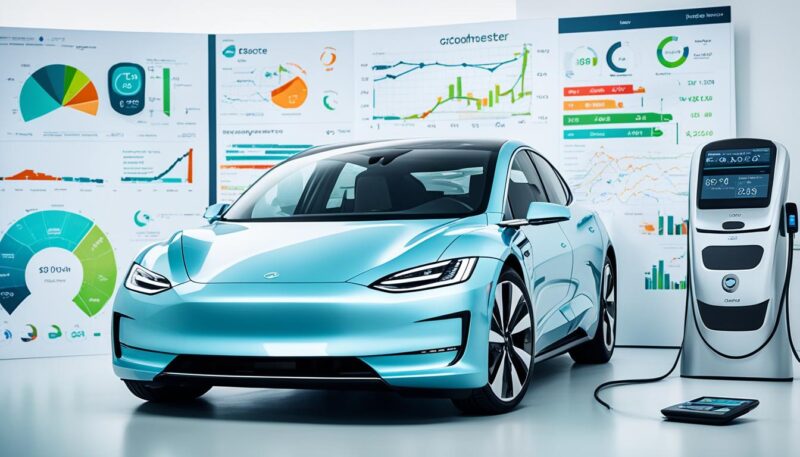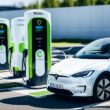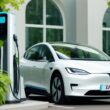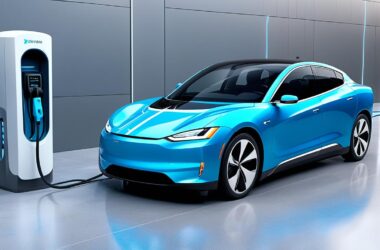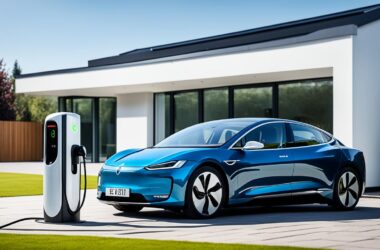In an electric vehicle (EV), the miles per kWh figure tells you how many miles the car will go on 1 kWh, or unit, of electricity. This is an important factor to consider for efficient trip planning and energy use optimization. By calculating the electric vehicle efficiency, you can determine the number of miles you can expect to travel on a fully charged battery. The calculation is based on the car’s battery capacity and its official range. Additionally, understanding the cost of home charging is essential for calculating the overall efficiency and expenses of an electric car.
Key Takeaways
- Calculating miles per kWh helps optimize trip planning and energy use in electric vehicles.
- Electric vehicle efficiency depends on the battery capacity and official range.
- Understanding home charging costs is crucial for overall efficiency calculations.
- The miles per kWh figure serves as a valuable comparison tool when buying an electric car.
- Consider factors like driving behavior and regenerative braking for maximum efficiency.
How to Calculate Electric Vehicle Efficiency
In order to determine the efficiency of an electric vehicle (EV) and understand its energy consumption, it is important to calculate its fuel economy or electric car economy. This can be done by considering the car’s battery capacity and its official range. For example, if an electric car has a 40-kWh battery pack and a 100-mile range, its economy or consumption figure would be 2.5 miles/kWh.
To further measure the efficiency, one can calculate kWh per mile. This can be achieved by using the following formula: distance traveled (in miles) divided by energy consumed (in kilowatt-hours). By performing this calculation, you can determine the fuel economy of an electric vehicle and gain insights into its energy efficiency.
This calculation is crucial for understanding the energy consumption and optimizing the cost of driving an electric car. It allows individuals to make informed decisions about their vehicle’s efficiency and effectively plan their trips, ensuring that their energy consumption aligns with their needs. By maximizing efficiency, drivers can achieve longer driving ranges and reduce their overall energy costs.
Measuring kWh per mile
Measuring kWh per mile is a straightforward process that requires the distance traveled in miles and the energy consumed in kilowatt-hours. By dividing the distance traveled by the energy consumed, you can obtain the kWh per mile figure that represents the efficiency and fuel economy of the electric vehicle.
Example calculation:
Distance traveled: 100 miles
Energy consumed: 40 kWh
kWh per mile: 40 kWh / 100 miles = 0.4 kWh per mile
By accurately measuring kWh per mile, drivers can gain a comprehensive understanding of their electric vehicle’s fuel efficiency and make informed decisions regarding their driving habits, charging needs, and overall energy consumption. This metric is essential for optimizing the cost and environmental impact of electric cars.
Optimizing Energy Consumption
Understanding electric vehicle efficiency goes beyond calculating fuel economy. It also involves adopting practices that optimize energy consumption. By implementing techniques such as regenerative braking and maintaining an optimal driving style, drivers can further enhance the efficiency of their electric vehicles.
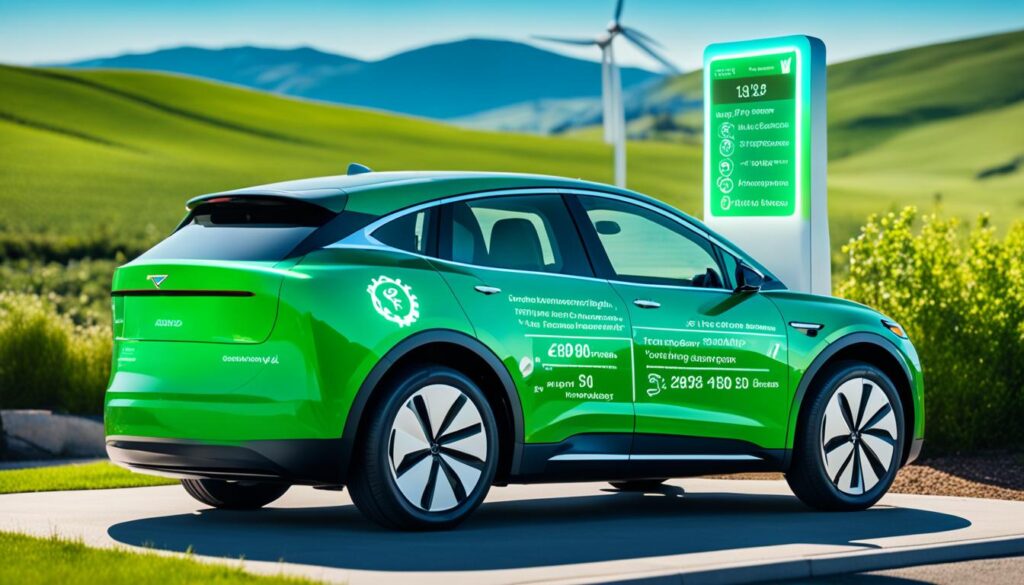
| Driving Technique | Energy Consumption |
|---|---|
| Aggressive driving, frequent acceleration, and hard braking | High energy consumption |
| Smooth and gradual acceleration, gentle deceleration using regenerative braking | Optimized energy consumption |
| Driving at a constant, moderate speed | Efficient energy consumption |
By adopting efficient driving techniques, electric vehicle owners can maximize the range of their vehicle, reduce the frequency of charging, and ultimately lower their energy costs. This not only benefits the individual driver but also contributes to a more sustainable and eco-friendly transportation system as a whole.
Estimating Charging Costs and Driving Range
To estimate the cost of home charging for your electric car, you need to consider the capacity of the car’s battery measured in kilowatt-hours (kWh) and the price per kilowatt (kW) of electricity from your supplier. Multiply the battery capacity by the electricity tariff to determine the approximate cost of a full charge. For example, let’s look at the entry-level Hyundai IONIQ 5, which has a 58-kWh battery and an electricity tariff of 22p per kW. Using the formula (battery capacity * electricity rate), we can estimate that a full charge would cost £12.76.
The driving range of an electric car is influenced by various factors, including battery capacity, temperature, and driving style. The larger the battery capacity, the greater the potential range. However, it’s important to note that extreme temperatures can affect the range, with extreme cold or hot conditions leading to reduced efficiency. Additionally, aggressive driving styles or high speeds can contribute to greater energy consumption and, subsequently, a shorter driving range. On the other hand, employing regenerative braking, an efficient technique that charges the battery when decelerating, can help maximize the range. By considering these factors, you can estimate the realistic driving range of your electric vehicle.
Example Estimation of Charging and Range:
| Electric Car Model | Battery Capacity (kWh) | Electricity Tariff (p/kW) | Estimated Cost of Full Charge (£) | Estimated Range (miles) |
|---|---|---|---|---|
| Hyundai IONIQ 5 | 58 | 22 | 12.76 | Up to 298 |
As shown in the example estimation table, the Hyundai IONIQ 5 with its 58-kWh battery and an electricity tariff of 22p per kW would cost approximately £12.76 for a full charge. With this charge, the estimated driving range can reach up to 298 miles. It’s important to note that these estimations are approximate and may vary based on individual driving conditions and battery performance.
Understanding the relationship between charging costs and driving range is vital for effectively managing the energy consumption of an electric vehicle. By estimating the costs and range, you can plan your charging needs and optimize your driving habits to ensure a consistent and efficient travel experience.
Miles per kWh as a Comparison Tool
The miles per kWh figure is a valuable comparison tool when buying an electric car. It indicates how many miles you can travel for every unit of electricity. This figure is often more important than the car’s official range. A higher miles per kWh figure means better efficiency and lower energy consumption.
When comparing electric car efficiency, it’s crucial to consider the overall weight and design of the vehicle. Sometimes, a smaller battery with a higher efficiency can still offer a comparable range to a larger battery with lower efficiency.
| Electric Car Model | Miles per kWh Figure |
|---|---|
| Vauxhall Corsa Electric | 4.0 miles/kWh |
| Fiat 500 Electric | 3.5 miles/kWh |
As you can see from the table above, the Vauxhall Corsa Electric and Fiat 500 Electric offer high miles per kWh figures, making them efficient options for environmentally conscious buyers. Understanding the miles per kWh figure can help you make informed decisions about electric car purchases, ensuring you choose a vehicle that maximizes energy efficiency and minimizes operating costs.
By comparing electric car efficiency using the miles per kWh figure, you can prioritize vehicles that offer better energy consumption and optimize your driving experience.
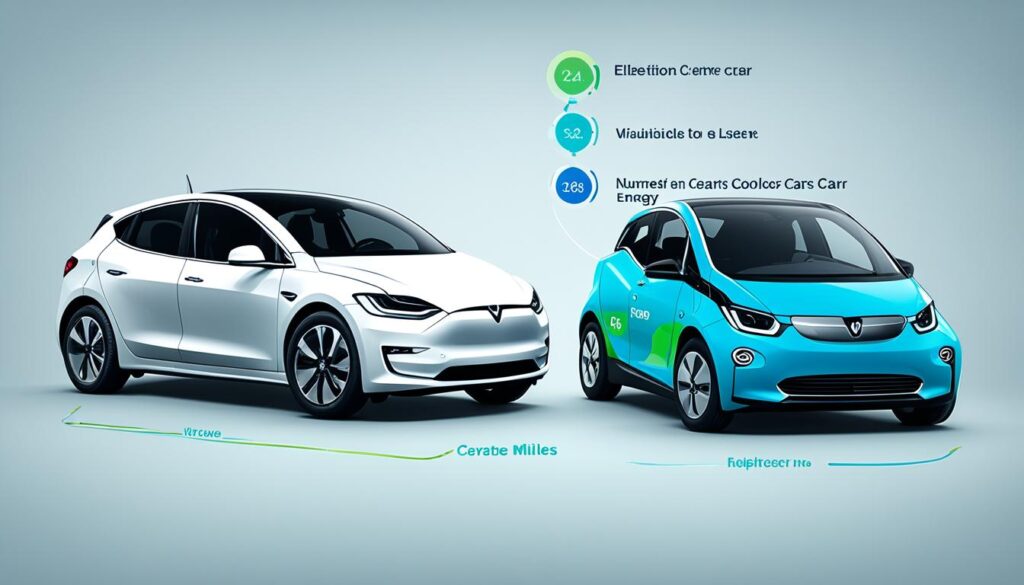
Electric Car Efficiency Examples:
“Choosing an electric car with a higher miles per kWh figure, such as the Vauxhall Corsa Electric with 4.0 miles/kWh, can significantly reduce your carbon footprint and save you money on fuel costs. It’s important to consider both the range and efficiency of the vehicle to ensure a sustainable and cost-effective choice.” – Electric Car Enthusiast
Conclusion
Calculating the miles per kWh figure is essential for optimizing the energy use and trip planning of electric vehicles. By understanding the efficiency and consumption of an electric car, you can estimate driving range and charging costs. This information helps in making informed decisions about EV purchases and ensuring efficient use of energy.
The miles per kWh figure serves as a comparison tool and allows for cost-effective and eco-friendly travel. When comparing electric car options, a higher miles per kWh figure indicates better efficiency and lower energy consumption. Consider factors like driving behavior, temperature, and regenerative braking to maximize the efficiency and overall performance of electric vehicles.
Efficient trip planning is crucial for electric vehicle owners. By optimizing energy use, you can extend your driving range and reduce the frequency of charging. Calculating the miles per kWh figure helps you plan your trips more effectively, ensuring that you reach your destination without running out of battery. This not only saves you time but also minimizes the environmental impact of your travel.
In conclusion, understanding electric vehicle efficiency, optimizing energy use, and efficient trip planning are key factors for maximizing the benefits of owning an electric car. By taking into account the miles per kWh figure, you can make informed decisions, save on charging costs, and contribute to a greener future.





